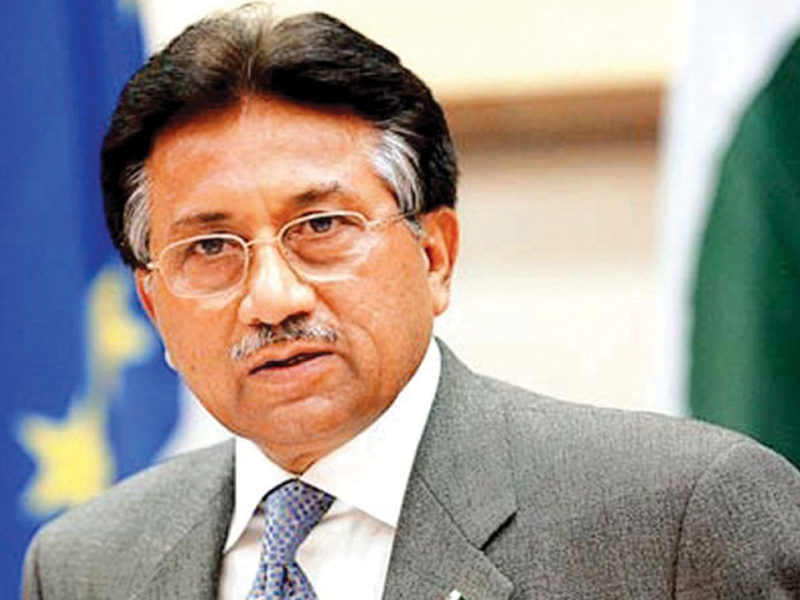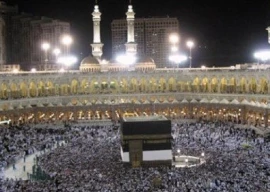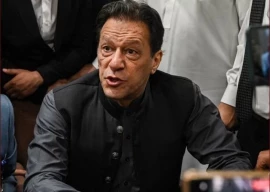
The procedure to prosecute Gen (retd) Pervez Musharraf for treason began on Monday as the Supreme Court accepted a government request to set up a ‘special court’ to try the former military ruler under Article 6 of the 1973 Constitution.
A spokesman for the Supreme Court announced in a statement that the top court had received a letter from the federal law ministry asking for the establishment of a “special court to try General (retd) Pervez Musharraf under Section 2 of the High Treason Punishment Act” of the Constitution.
After receiving the letter, Chief Justice Iftikhar Muhammad Chaudhry directed the chief justices of all five high courts to put forward the names of any judges eligible for the three-judge special court by Wednesday, the statement added. Out of this list Justice Chaudhry will then choose three names for the special court and forward them to the government.
“Copies of the letter be circulated amongst the learned chief justices of all high courts… so that they may each nominate a judge of their respective court, out of which three names shall be forwarded to the government for the special court. The nomination may reach this court on November 19 positively,” reads the statement.
It further says that “in pursuance of the letter received from secretary M/o Law, Justice and Human Rights, Islamabad, addressed to the registrar, Supreme Court, stating that the federal government has decided to invoke the powers vested in it under Section 4 of the Criminal Law Amendment (Special Courts) Act, 1976 to establish a special court to try Gen (retd) Pervez Musharraf under Section 2 of the High Treason (Punishment) Act, 1973.”
Citing the law, the law ministry stated in its letter that the special court shall comprise three serving high court judges. And since there are five high courts and it would be difficult to nominate three judges for the special court, it would be appropriate that the apex court nominate judges from the high courts.
“It is, therefore, requested that the instant matter may please be placed before the chief justice of Pakistan for the nomination of three judges from the high courts. It is also requested that out of three judges, one may be nominated to be the president of the special court and this special court will function in Pakistan,” it added.
In a related development, the federal government also announced that Advocate Zulfiqar Abbas Naqvi will be the special prosecutor who will assist the special court in Musharraf’s treason trial. However, no notification was issued in this regard.
The decision to try Musharraf for treason, announced at a news conference by Interior Minister Chaudhry Nisar Ali Khan on Sunday, comes after the former military ruler was granted bail in other cases against him, including the assassination of former prime minister Benazir Bhutto, killing of Baloch nationalist leader Nawab Akbar Khan Bugti and Lal Masjid operation.
The treason accusation relates to Musharraf’s decision in 2007 to impose emergency rule shortly before the Supreme Court was due to decide on the legality of his re-election as president a month earlier while he was still army chief.
Published in The Express Tribune, November 19th, 2013.
COMMENTS (14)
Comments are moderated and generally will be posted if they are on-topic and not abusive.
For more information, please see our Comments FAQ
1732521023-0/biden-(1)1732521023-0-405x300.webp)
1732520496-0/BeFunky-collage-(86)1732520496-0-165x106.webp)
1732519472-0/lamar-(3)1732519472-0-165x106.webp)
1732519298-0/BeFunky-collage-(85)1732519298-0-165x106.webp)

1732515558-0/Copy-of-Untitled-(76)1732515558-0-270x192.webp)




1732513395-0/Copy-of-Untitled-(75)1732513395-0-270x192.webp)






After declaring dead soldiers as non-martyrs,and most notorious criminals as martyrs,this was a logical next step. Taliban all the way!!
Perhaps the last bouncer of CJ against this brave General who always thought about the prosperity of Pakistan.
@Lyari: Quote, When mass population will have freedom from those self-serving and self-indulgent elite? unquote.
When the mass population stop voting the same elite thinking there will be a different result.
@Waseem:
Thats right all of them are fearful of Musharraf. There is a rumour in the news that on Aug 31 of this year a govt. delegation went to meet at his house and offering him free from all cases if Musharraf promise to leave the country for good.
Pakistan is experimental lab for a small elite. When mass population will have freedom from those self-serving and self-indulgent elites?
This opportunity must be availed to send clear message to anti constitutional forces. If we don't punish those who were supposed to protect constitution but abrogated it, how can we punish those forces who don't believe in constitution.
Inshallah Musharraf will emerge as victorious. Already failed rulers will miserably fail before they pack up..
How scared and fearful all of them are from Musharraf who is genuine country loving leader is.
Okay! tell me who pushed me from behind? Now blanket is not leaving me. But I was not alone. There were several behind this drama including the then corps commander of Karachi. Why don't you charge and arrest them? Remember: What you did to boys in Kargil. You abandoned them. Some came back demoralized and were abandoned. Others died there of enemy fire, starvation, and because of absence of logistics including medical support. Nature has its way of settling the score.
About time too. People breaking the law with impunity should learn their lesson. Rope in all others also involved as suggested by ex-usurper's lawyer.
General Pervez Musharraf is indeed a brave man facing all the cases. Long Alive General Saab
The General should have his day in a court of law like any other human being. Where are those who talk about everybody is equal in Islam and there should be no question of immunity when it comes to elected leaders?
Our thoughts and prayers are with you Gen. Musharraf.